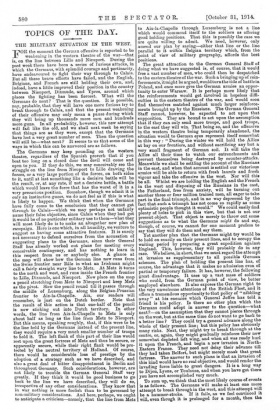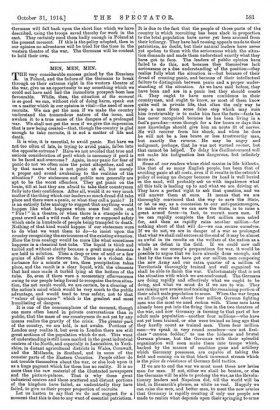TOPICS OF THE DAY.
THE MILITARY SITUATION IN THE WEST. FOR the moment the German offensive is reported to be weakening in the western theatre of the war—that is, on the line between Lille and Nieuport. During the past week there have been a series of furious attacks, in which the Germans, with splendid courage and pertinacity, have endeavoured to fight their way through to Calais.
But all these brave efforts have failed, and the English, Belgians, and French are still holding their own, and, indeed, have a little improved their position in the country between Nieuport, Dixmude, and Ypres, around which places the fighting has been fiercest. What will the Germans do next ? That is the question. It is possible, nay, probable, that they will have one more furious try to break through to Calais, and that the present weakening of their offensive may only mean a pause during which they will bring up thousands more men and hundreds more guns. In all probability, however, this new attempt will fail like the old, and we shall next week be saying that things are as they were, except that the Germans have lost a very great number of men. Then the question will still be—what next ? It seems to us that some of the ways in which this can be answered are as follows.
The Germans may keep pounding on the western theatre, regardless of the Spanish proverb that if you beat too long on a closed door the devil will come and open to you. If they do this, we may conceivably see the struggle on the line from Nieuport to Lille drawing the forces, or a very large portion of the forces, on both sides to it, until at last something like a decisive battle will be the result, or, at any rate, if not a decisive battle, a battle which would leave the force that has the worst of it in a very precarious position. Somehow, though we admit it is only an instinctive guess, we do not feel as if this is what is likely to happen. We think that when the Germans have fully come to the conclusion that they cannot get through to Calais—which we may perhaps not unfairly name their false objective, since Calais when they had got it would be of no particular military use to them—what they will most likely do is to make an altogether new plan of campaign. Here is one which, in all humility, we venture to suggest as having some attractive features. It is surely not necessary to defend ourselves from the accusation of suggesting plans to the Germans, since their General Staff has already worked out plans for meeting every conceivable contingency, and has nothing to learn in this respect from us or anybody else. A glance at the map will show how the German line now runs from the Swiss frontier near Bale in what an Irishman might call a fairly straight wavy line to Metz. At Metz it turns to the north and west, and runs inside the French frontier to Lille, Dixmude, and Nieuport. Now place on the map a pencil stretching from Metz to Nieuport and keep Metz as the pivot. Slew the pencil round till it passes through the middle of Luxemburg, along the Belgian-Prussian frontier to Aix-la-Chapelle. Aix, our readers will remember, is just on the Dutch border. Note that the result of this action is that one-half of the pencil is now sticking out into Dutch territory. In other words, the line from Aix-la-Chapelle to Metz is only about half as long as the line from Metz to Nieuport. But this means, speaking roughly, that, if this were to be the line held by the Germans instead of the present line, they would require a very much smaller number of troops to hold it. The left flank of this part of their line would rest upon the great fortress of Metz and thus be secure, or apparently secure, while their right flank would be pro- tected by the neutral territory of Holland. Of course, there would be considerable loss of prestige by the adoption of a strategy such as we have described, and also a great deal of bitter disappointment in Berlin and throughout Germany. Such considerations, however, are not likely to trouble the German General Staff very greatly. If they think it would be good business to go back to the line we have described, they will do so, irrespective of any other considerations. They know that in war nothing is more foolish than to be governed by non-military considerations. And here, perhaps, we ought to anticipate a criticism—namely, that the line from Metz to Aix-la-Chapelle through Luxemburg is not a line which would commend itself to the soldiers as offering good holding positions. That this is possibly the case we are quite willing to admit. We need, however, only amend our plan by saying—either that line or the line parallel to it within, Belgian territory which, from the point of view of military geography, affords the best positions.
The great attraction to the German General Staff of doing what we have suggested is, of course, that it would free a vast number of men, who could then be despatched to the eastern theatre of the war. Such a bringing up of rein- forcements, it migh t be argued, would turn the tide of battle in Poland, and once more give the German armies an oppor- tunity to enter Warsaw. It is perhaps more likely that the reinforcements would get involved in hopeless diffi- culties in the eastern theatre of the war, and would soon find themselves matched against much larger reinforce- ments brought up by the Russians. The German General Staff cannot, however, be expected to act upon that supposition. They are bound to act upon the assumption that if they can only send more troops, and good troops, to the east they will win. That being so, and the offensive in the western theatre being temporarily abandoned, the situation would to German eyes represent itself somewhat in this way : "During the winter we will hold the Allies at bay on our frontiers, and without sacrificing any but a, very small fragment of German soil. It will take the Allies all their time to watch our entrenchments and prevent themselves being destroyed by counter-attacks. Meanwhile we shall be settling the account of the Russians in the east, and when that account is settled our victorious armies will be able to return with fresh laurels and fresh vigour and take the offensive in the west. Nor will this be all. Whilst we are holding the English and the French in the west and disposing of the Russians in the east, the Fatherland, free from anxiety, will be turning out another three or four million trained men, all eager to take part in the final triumph, and in no way depressed by the fact that such a triumph has not come so rapidly as some optimistic people thought it would." We could easily find plenty of holes to pick in this view, but that is not our present object. That object is merely to throw out some suggestions as to what the Germans might do and say, though, of course, we cannot for one moment profess to say that they will do them and say them.
Yet another plan that the Germans might try would be to hold on exactly on their present lines, and to occupy the waiting period by preparing a great expedition against England. This, however, they will probably do in any case. We believe, in short, that we must regard the atte napt at invasion as supplementary to all possible German schemes. The plan of holding the present line has, of course, the advantage that it makes no admission even of partial or temporary failure. It has, however, the following great disadvantage. It uses up a vast mass of soldiers who could, from the German point of view, be better employed elsewhere. It also exposes the German right to the very unwelcome attentions of the British Fleet, and it offers a tremendous opportunity to that policy of "nibbling away" at his enemies which General Joffre has told a friend is his policy. Is there no other plan which the Germans could adopt in answer to the question—what next ?—on the assumption that they cannot pierce through on the west, but at the same time do not want to go back to a better line ? They could try a. general advance along the whole of their present line; but this policy has obviously many risks. Next, they might try to break through at the centre, or, again, they might gradually reinforce their now somewhat depleted left wing, and when all was ready hurl it upon the French, and begin a new invasion in North- Eastern France. They need not delay their advance till they had taken Belfort, but might merely mask that great fortress. The answer to such plans is that an invasion of this kind would have no real objective, and would render the invading force liable to great dangers. It is a long way to Dijon, Lyons, or Toulouse, and when you have got there you have not accomplished very much.
To sum up, we think that the most likely course of events is as follows. The Germans will make at least one more attempt to break through in the west, and this attempt will be a hammer-stroke. If it fails, as we feel convinced it will, even though it is prolonged for a month, then the Germans will fall back upon the short line which we have described, using the troops saved thereby for work in the east. They certainly need them badly enough in Poland at the present moment. If this is the policy adopted, then in our opinion no adventures will be tried for the time in the western theatre of the war. The Germans will be content to hold their own.



































 Previous page
Previous page